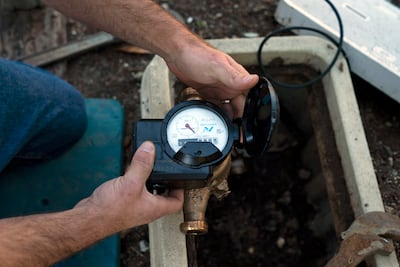The need to improve water conservation exists everywhere, but it is particularly acute in Gulf countries, due to their largely arid climate. Recent research suggests that providing residential users with tailored instructions on how to decrease water consumption – known as a water audit – can lead to sustained improvements in water conservation, especially when combined with financial incentives. However, Gulf water authorities must work with local researchers to maximise the value of these methods.
In any country, ensuring a stable supply of water for its residents is one of the government’s highest priorities. Unfortunately, due to a combination of rising populations, economic growth and climate change, the demand for water is rising, threatening the sustainability of existing sources.
Gulf countries have traditionally relied upon energy-intensive water desalination, which creates a broad range of sustainability problems. These include depletion of the fossil fuels used to power the process; an increased carbon footprint; and threats to marine biodiversity in the areas around treatment plants. These biophysical challenges are exacerbated by the rising financial cost as generous water consumption subsidies are placing a large strain on government budgets.
For this reason, all governments – including those in the Gulf – are constantly searching for methods to improve water conservation. Notably, given the centrality of human decision-making to the issue of water consumption, decreasing water demand requires an interdisciplinary approach that spans both the natural and the social sciences. Engineers and hydrologists tackle the technical aspects, while economists and social psychologists focus on the behavioural aspects of the problem.

In western countries, during the past 20 years, water authorities have been co-operating with interdisciplinary teams of researchers to improve water sustainability. Academic journals are full of field experiments conducted by scholars collaborating with water companies. When cost-effective methods are uncovered, they eventually make their way to the market. One of the most salient classes of interventions has been the “nudges” that have begun to appear in water bills, such as comparisons of a household’s consumption level to that of its neighbours in an attempt to leverage moral suasion.
In some Gulf countries, a quick search of the academic literature indicates that water companies are yet to take an interest in this local research partnerships approach. The result, for now, is a lack of implementation in some places of the latest knowledge acquired in the home-grown research community.
The importance of local research to water policy in the Gulf is elevated given the idiosyncrasies of water consumption. For example, Muslims constitute a large majority of the Gulf’s population, and they perform ablution multiple times a day in preparation for prayer, as well as bathing more frequently than their western counterparts due to religious stipulations. Using the research conducted by extra-regional scholars to inform water policy is a good first step, but it must be complemented by local follow-up research that ensures the applicability of findings from the international literature.
Nevertheless, there remains much to be learnt from tracking the output of interdisciplinary teams of western researchers studying water conservation. A recent example is a study titled “Do water audits work?”, authored by Dr Jesper Akesson (The Behaviouralist, a consultancy), Dr Rajat Kochhar (University of Chicago), Dr Robert Hahn (Oxford University) and Dr Robert Metcalfe (University of Southern California).
A home water audit involves a water company sending a specialist to a residential unit to look for ways of decreasing that household’s water consumption. This can be achieved through a variety of methods, including the installation of water-saving devices and educating the residents on how to conserve water.

The authors find that water audits are effective in decreasing a household’s water consumption in the UK, with savings of the order of about 17 per cent. However, people do not volunteer for water audits. Accordingly, the authors also investigate the impact of offering financial incentives to households, and find that small gifts (about $15) are effective in increasing take-up. The combined effects of an incentive and an audit are especially large when they target high-consumption households.
Notably, the authors find that – when taking into account the cost of a water audit and of providing incentives – the net impact of these interventions is approximately zero, that is the benefits just about cover the costs. Therefore, in principle, water companies in some Gulf countries – where water audits are not a commonly used instrument – could respond to the study by offering a Gallic shrug and continuing to go about their daily business.
However, such a course of action might be hasty in the light of the region’s aforementioned idiosyncrasies. In terms of the mathematics of the accounting exercise performed by Dr Akesson and his colleagues, the presence of large subsidies and the reliance on energy-intensive water desalination are likely to amplify the holistic benefits of water audits.
Moreover, the direct effect on consumption is likely to be larger, too, especially if the specialist providing the water audit can instruct the household’s members on how to better conserve water when performing ablution. Anyone who has recently prayed at a mosque will have occasionally witnessed the disheartening over-consumption of water during the act of ablution, a phenomenon that is rendered all the more puzzling in the light of the explicit religious duty to conserve water.
Taken together, these points affirm the need to better link water policy in the Gulf to the work of home-grown researchers, even if the latter merely replicate the work of extra-regional researchers, but applied to a local context. Given the aggressive commitments that countries such as Bahrain, Saudi Arabia and the UAE have made to carbon neutrality, this kind of policy-research integration is likely to be a prerequisite for success.


